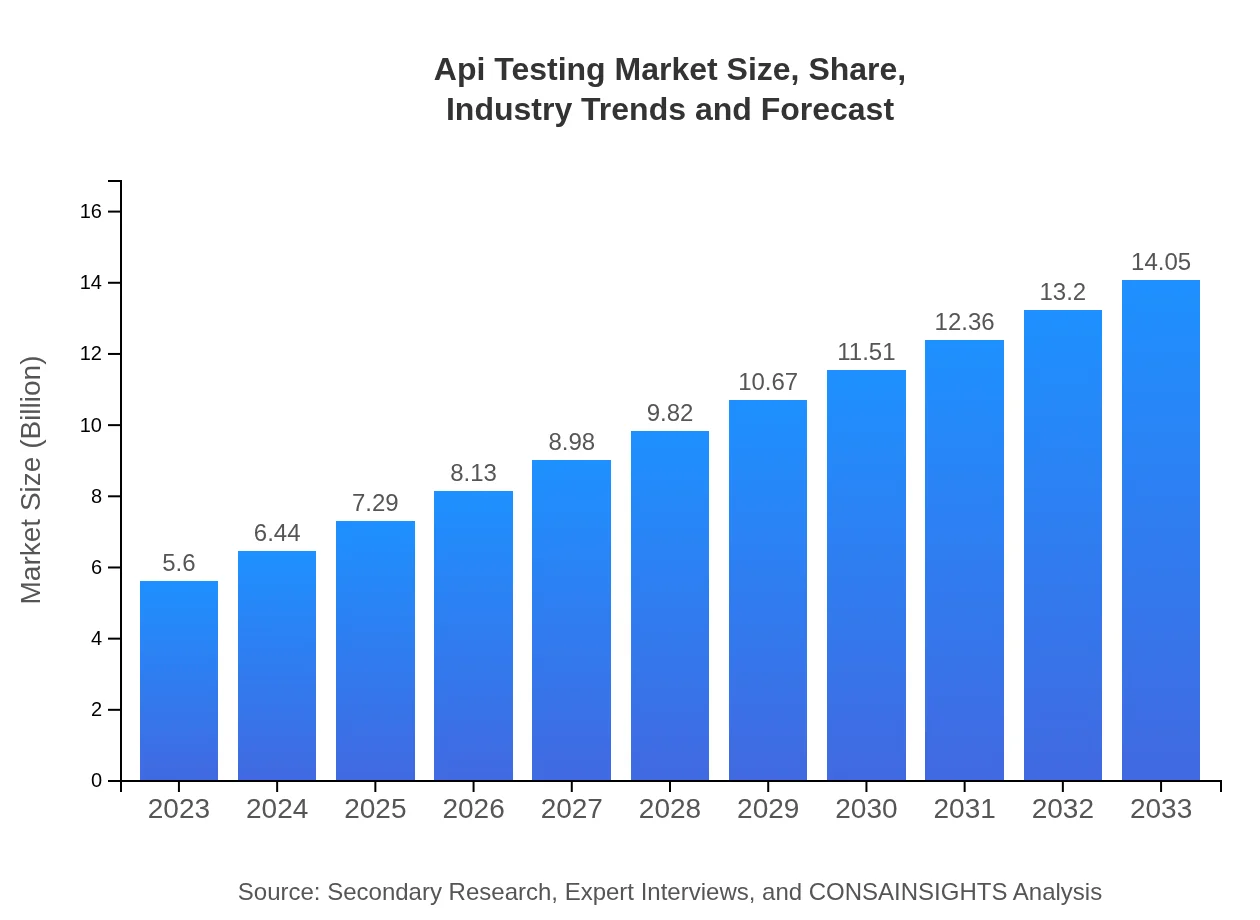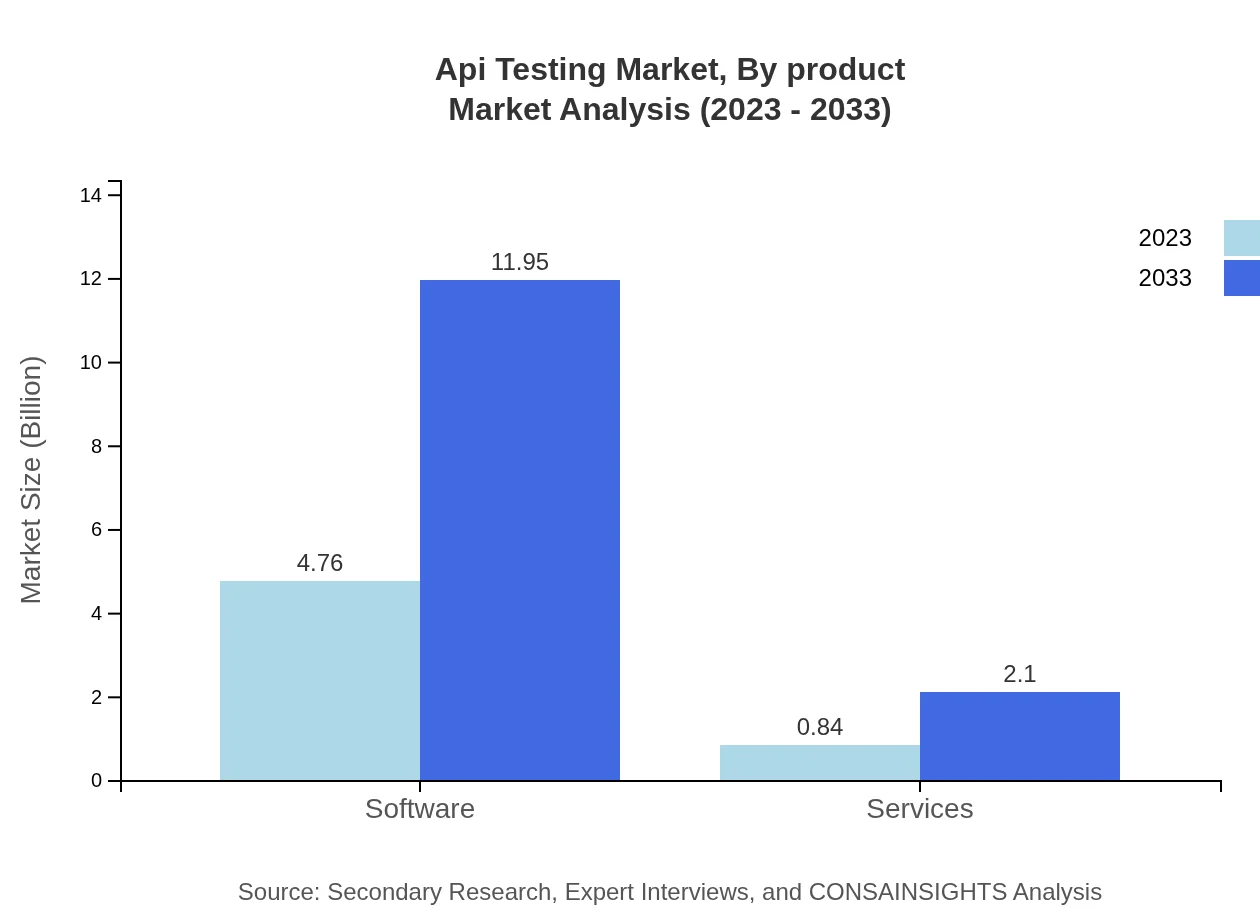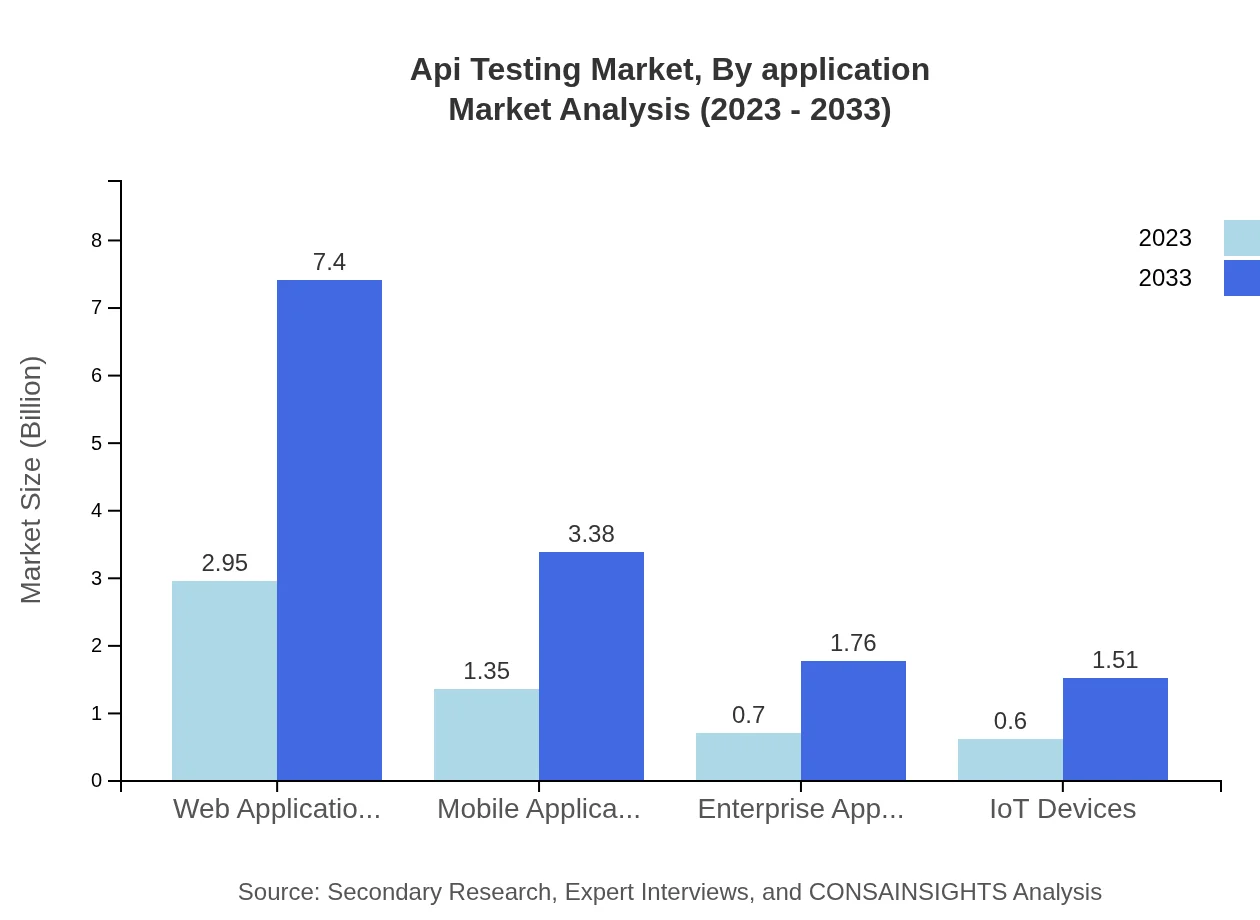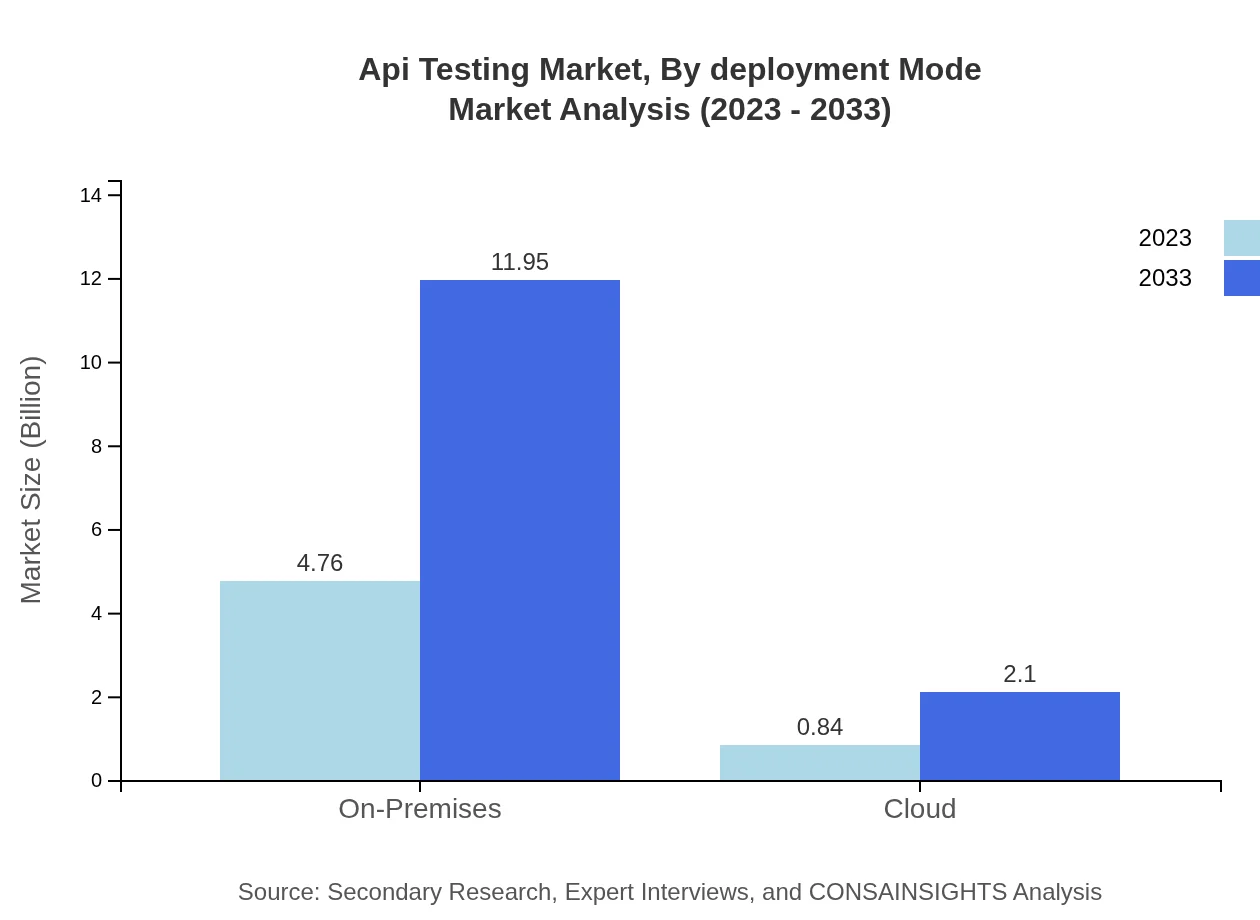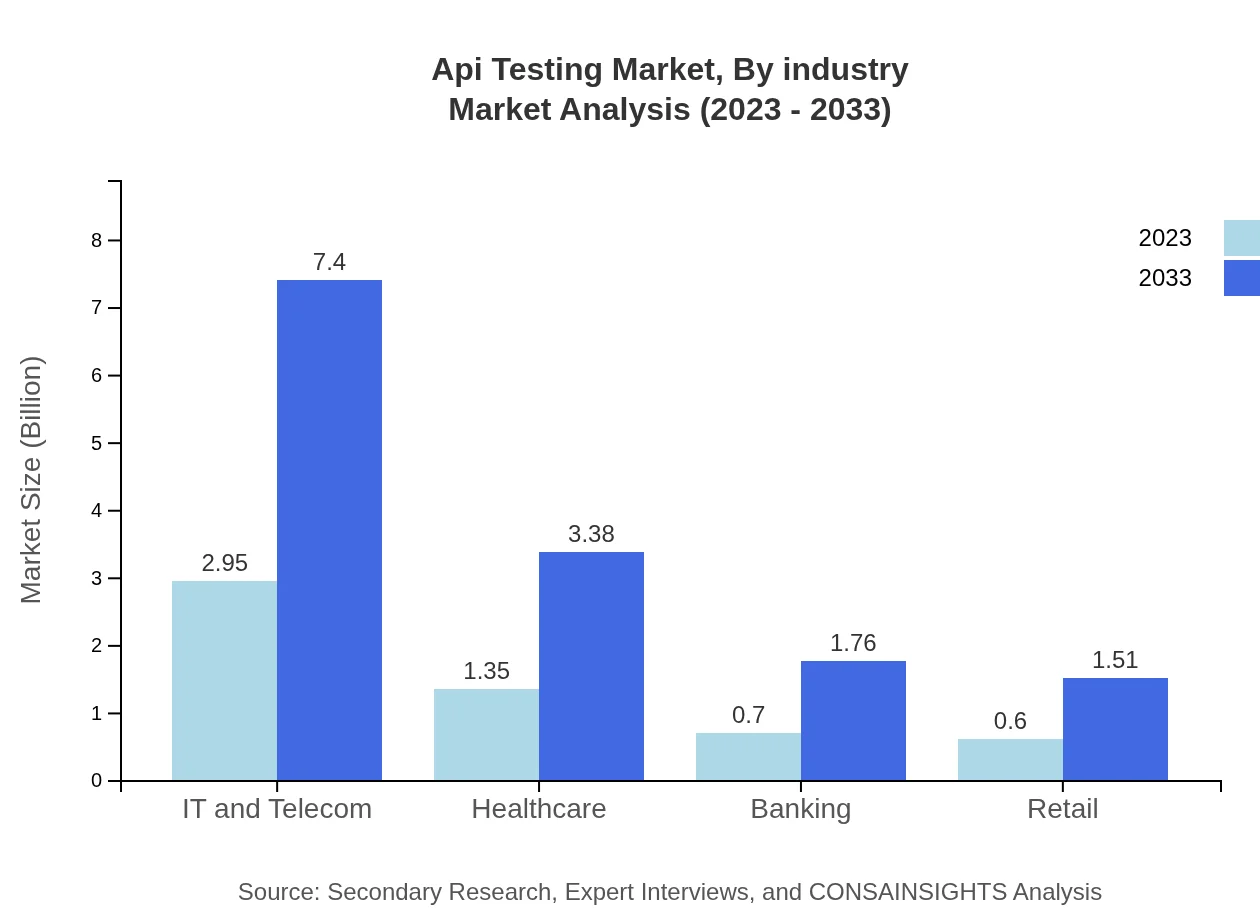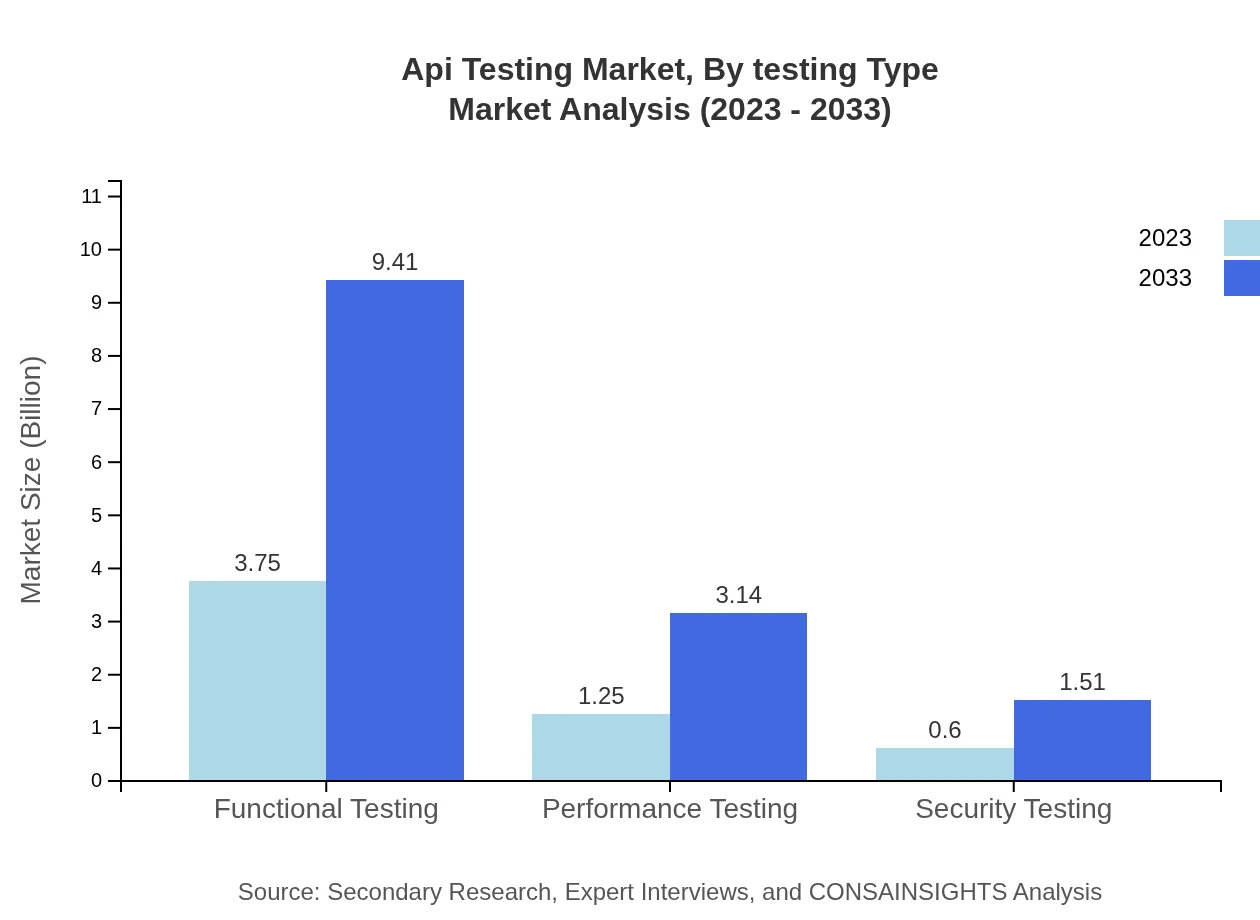Api Testing Market Report
Published Date: 31 January 2026 | Report Code: api-testing
Api Testing Market Size, Share, Industry Trends and Forecast to 2033
This report provides an in-depth analysis of the API Testing market, covering its size, growth trends, and emerging technologies. It presents insights into the market dynamics, segmentation, and regional performance, forecasting the outlook from 2023 to 2033.
| Metric | Value |
|---|---|
| Study Period | 2023 - 2033 |
| 2023 Market Size | $5.60 Billion |
| CAGR (2023-2033) | 9.3% |
| 2033 Market Size | $14.05 Billion |
| Top Companies | Postman, SoapUI, Katalon Studio, Ranorex, Apache JMeter |
| Last Modified Date | 31 January 2026 |
API Testing Market Overview
Customize Api Testing Market Report market research report
- ✔ Get in-depth analysis of Api Testing market size, growth, and forecasts.
- ✔ Understand Api Testing's regional dynamics and industry-specific trends.
- ✔ Identify potential applications, end-user demand, and growth segments in Api Testing
What is the Market Size & CAGR of the API Testing market in 2023?
API Testing Industry Analysis
API Testing Market Segmentation and Scope
Tell us your focus area and get a customized research report.
API Testing Market Analysis Report by Region
Europe Api Testing Market Report:
The European API Testing market is predicted to rise from $1.68 billion in 2023 to $4.23 billion by 2033. Regulatory constraints across industries, particularly in banking and healthcare, necessitate rigorous API testing, contributing to growth. Additionally, advancements in 5G network technology will bolster API functionality and testing.Asia Pacific Api Testing Market Report:
The Asia Pacific API Testing market is projected to grow from $1.05 billion in 2023 to $2.63 billion by 2033. The rapid digital transformation and the growing software development sector in countries like India, China, and Japan significantly drive this growth, as businesses increasingly adopt automation in their testing processes.North America Api Testing Market Report:
North America remains the largest market for API Testing, with estimated growth from $2.05 billion in 2023 to $5.13 billion by 2033. The strong presence of major software companies and a high adoption rate of cloud-based services and microservices architecture drive this advancement. North American firms are significant early adopters of innovative API testing technologies.South America Api Testing Market Report:
In South America, the API Testing market is evolving, expected to increase from $0.11 billion in 2023 to $0.28 billion by 2033. Despite the modest size, the market is projected to grow as local enterprises begin to integrate advanced testing solutions into their workflows, aiming to enhance operational efficiency.Middle East & Africa Api Testing Market Report:
The Middle East and Africa market is expected to transition from $0.71 billion in 2023 to $1.78 billion by 2033. Increased digitalization efforts amid regional economic diversification strategies are catalyzing investments in API and software testing solutions.Tell us your focus area and get a customized research report.
Api Testing Market Analysis By Product
In 2023, the software segment dominates the API Testing market with a valuation of $4.76 billion, representing 85% of the market share. This trend is anticipated to continue, reaching $11.95 billion by 2033, reflecting the growing reliance on software testing for delivering high-quality API services. In contrast, services accounted for $0.84 billion or 15% of the market share in 2023, projected to grow to $2.10 billion by 2033.
Api Testing Market Analysis By Application
Functional testing leads the API Testing market, holding a market size of $3.75 billion in 2023, representing a 66.95% market share. Performance testing follows closely with $1.25 billion (22.32% share), and security testing commands $0.60 billion (10.73%). As companies continue to prioritize quality assurance in API functionalities, these segments are poised for significant growth.
Api Testing Market Analysis By Deployment Mode
On-Premises deployment models currently dominate the API Testing market with a size of $4.76 billion in 2023, equating to 85.05% of the market. Cloud-based solutions, while smaller, are growing rapidly, expanding from $0.84 billion in 2023 to $2.10 billion by 2033, representing a significant shift toward more scalable testing environments.
Api Testing Market Analysis By Industry
The IT and telecom sector leads the API Testing market with a size of $2.95 billion (52.7% share) in 2023, projected to reach $7.40 billion by 2033. The healthcare sector follows, with $1.35 billion (24.07% share), and the banking sector stands at $0.70 billion (12.5% share). Other industries, including retail and enterprise applications, are also growing steadily as digital services proliferate.
Api Testing Market Analysis By Testing Type
Functional testing leads the growth in API Testing with a size of $3.75 billion in 2023, capturing 66.95% of the market. Due to increasing cyber threats, security testing's share remains crucial, at 10.73% and expected to grow steadily. Performance testing remains essential, capturing a good portion at 22.32%.
API Testing Market Trends and Future Forecast
Tell us your focus area and get a customized research report.
Global Market Leaders and Top Companies in API Testing Industry
Postman:
Postman is a leading API development environment known for its robust API testing capabilities. The platform enhances collaboration and productivity for API developers and testers.SoapUI:
SoapUI is a widely-used API testing tool powered by SmartBear, offering comprehensive functional, security, and performance testing features specifically tailored for web services.Katalon Studio:
Katalon Studio provides a versatile solution for API testing, integrating seamlessly with other test automation features and enabling teams to develop robust tests across various applications.Ranorex:
Ranorex delivers a powerful suite of tools for API testing, supporting various protocols and ensuring quality assurance through its automated testing solutions.Apache JMeter:
As an open-source tool for performance testing of APIs, JMeter is instrumental for developers and testers seeking to ensure their APIs can handle load and functionality.We're grateful to work with incredible clients.









FAQs
What is the market size of API Testing?
The global API Testing market is currently valued at approximately $5.6 billion in 2023, with a projected compound annual growth rate (CAGR) of 9.3% through 2033, indicating sustained growth in this sector.
What are the key market players or companies in the API Testing industry?
Key players in the API Testing industry include companies like Postman, SoapUI, JMeter, and Apigee. These firms are pivotal in driving advancements and innovations within API testing technologies.
What are the primary factors driving the growth in the API Testing industry?
The growth is primarily driven by the increasing adoption of APIs across various industries, the demand for improved software quality, and the rising need for automation in testing processes to enhance efficiency.
Which region is the fastest Growing in the API Testing?
The fastest-growing region in the API Testing market is North America, projected to grow from $2.05 billion in 2023 to $5.13 billion by 2033, driven by technological advancements and high demand for software solutions.
Does Consainsights provide customized market report data for the API Testing industry?
Yes, Consainsights offers customized market reports tailored to specific business needs, including detailed analyses and insights relevant to the API Testing industry.
What deliverables can I expect from this API Testing market research project?
Expect comprehensive reports detailing market size, growth forecasts, trends, competitive analysis, and segmentation data, allowing for informed strategic decision-making.
What are the market trends of API Testing?
Current trends include increasing cloud adoption, a surge in mobile and web applications, emphasis on security testing, and the shift towards automation in testing processes.

